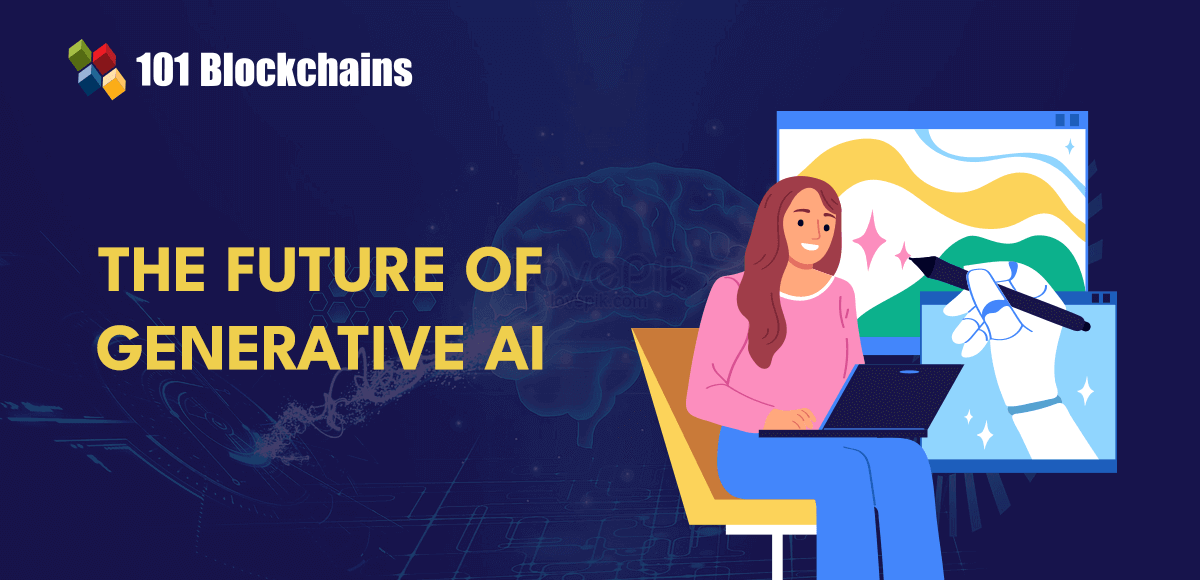The future of generative AI: predictions and possibilities

Generative AI has emerged as one of the prominent features of artificial intelligence. Many industries have embraced various use cases of generative AI with the help of tools such as ChatGPT, Stable Diffusion, and DALL-E. However, it is important to recognize that the future of generative AI is still a long way off.
Innovative developments in generative AI can help bring real change to the functioning of business and society. By adopting AI tools, businesses can complete tasks that used to take weeks to complete in a matter of days. At the same time, some reports have suggested that AI handles nearly 44% of customer service requests.
On the other hand, more people are concerned about data privacy, bias, and ethics in generative AI. In fact, approximately 81% of users want humans to review and validate generated AI output.
With only 37% of users trusting AI results, the future prospects for generative AI may seem pessimistic. However, brands have been turning to generative AI to improve customer engagement with better efficiency. IDC predicts that global AI spending will increase by nearly 27% in 2023. Let’s take a look at some of the key predictions to see the potential of generative AI.

Key predictions for the future of generative AI
2023 will mark one of the most notable milestones in history as generative AI gains mainstream popularity. As the generative AI space evolves in 2024, we expect to see numerous changes and trends that will transform generative AI and its applications.
Focuses attention on research-based predictions in response to questions such as “Does generative AI have a future?” For example, a McKinsey study found that generative AI could add nearly $4.4 trillion to the global economy each year. Will generative AI remain strong in the long term? Here are some important predictions about generative AI to keep an eye on in the future:
-
Generative AI becomes more mainstream
The most important prediction about the future of AI concerns the decline of the hype around generative AI. Since the launch of OpenAI’s ChatGPT, the realm of generative AI has continued to expand with the introduction of new models. It is important to note that the advanced machine learning algorithms that underpin generative AI solutions have been in development for decades. But no one paid attention to it until ChatGPT came along.
Since late 2022, the world has witnessed several iterations of generative AI technology. In fact, new generative AI models are introduced several times a month. In March 2023, the generative AI space witnessed promising improvements with the launch of financial services support and customer relationship management solutions.
By 2024, generative AI will no longer be a technological miracle. Rather, it will evolve at a rapid pace and get closer to users without any barriers.
Unleash the full potential of generative AI in your business use cases and identify new ways to become an expert in generative AI technologies with the Generative AI Technology Path.
-
Faster progress toward productivity
Artificial intelligence is designed to replicate human intelligence. It is therefore reasonable to assume that generative AI predictions will reveal the possibility of achieving human-like performance. According to a McKinsey study, generative AI could reach intermediate levels of human performance by 2030.
Additionally, projections suggest that the performance of generative AI will be equivalent to that of the top 25% of people completing specific tasks by 2040. Generative AI could therefore help the technology achieve human-like performance on some tasks sooner than expected.
-
Automate knowledge tasks
Predictions about generative AI also point to the potential for automation in knowledge fields. The increased technical capabilities of generative AI could have a profound impact on the activities of educators, creators, and professionals. The future of generative AI may mirror past examples of how automated technologies have impacted a variety of physical activities.
Generative AI is likely to have a huge impact on knowledge fields, especially in the areas of collaboration and decision-making. Professionals working in education, art, law, and technology can expect faster automation of many aspects of their work. This type of development will be driven by generative AI’s ability to predict patterns in natural language. Moreover, generative AI can also ensure dynamic use of natural language patterns for better results.
Want to develop your ChatGPT skills to become familiar with AI language models? Enroll in ChatGPT Basics Course Now
-
Multi-mode creation AI
One of the most surprising predictions about the future of AI focuses on multimodal generative AI. You can find different types of generative AI tools with unique features. For example, some generative AI tools can write, while others can generate, listen, view, and read. As generative AI expands further, it can handle all of these tasks at once, including generating text and images simultaneously. For example, DALL-E 3 can generate high-quality text embedded in images.
As a result, it will be a better and more powerful alternative to competing image creation tools. Therefore, predictions about generative AI indicate that multimodal generative AI will become the norm. This will help generative AI create in real-time and in many different ways, just like humans.
Debates surrounding questions such as “Is there a future for generative AI?” are also generating interest in conversational AI. With the advent of conversational AI, generative AI bots will not only interact with users but also perform tasks. Conversational AI bots can delegate important tasks to other software as well as humans to complete tasks with desired results.
To understand what conversational AI means, you can refer to an example from software development. Generative AI has proven useful for code generation and testing. Introducing conversational capabilities in generative AI can help complete app development projects without human intervention.
-
Generative AI tools for a broader range of use cases
Generative AI tools have proven effective in generating various types of written, audio, video, and image content. In fact, software developers can trust generative AI tools to generate code for new projects. Companies have been actively developing generative AI apps to leverage the power of generative AI in these areas. Interestingly, generative AI predictions for the future suggest that generative AI will need to move beyond walled gardens. In the future, we can expect generative AI apps and tools targeting specific industries, use cases, and capabilities. Moreover, new apps and tools are likely to provide more value than typical generative AI tools.
Do you want to learn the basics of AI applications in business? Enroll in the AI For Business course today
-
Certain industries may benefit more
Generative AI has captured the attention of business leaders in nearly every major industry. However, it is important to measure the impact of generative AI on business functions across various industries. According to McKinsey’s generative AI predictions, some industries may benefit more than others.
The impact of generative AI on an industry will depend on a variety of factors, including the importance of business functions, the size of industry revenue, and the mix of business operations. The use of generative AI in almost every industry will significantly improve marketing and sales functions. On the other hand, banking and high-tech sectors can benefit more from generative AI to accelerate software development.
-
Emphasis on bridging the technology gap
As companies across a variety of industries set their sights on generative AI, it is important to understand the need for technology development. How can an organization embrace AI without the right talent? Therefore, the future of generative AI depends on how organizations identify employees with generative AI skills.
Generative AI tools can only deliver increased value to early adopters if they can bridge the skills gap. Therefore, companies will compete with each other to remain at the forefront of the generative AI talent market. Organizations must strive to provide rewarding work experiences for generative AI professionals while improving their talent management capabilities.
-
Generative AI’s impact on global GDP
Another important addition to generative AI predictions for the future concerns the contribution of generative AI to global GDP. According to McKinsey, generative AI can have a significant impact on improving labor productivity across a variety of sectors. Workers can leverage the value of these productivity gains by shifting to other work activities that help them achieve better productivity. Supporting training so workers can learn new skills and change roles can strengthen GDP growth while ensuring inclusion and sustainability.

Expected challenges in the area of generative AI
The benefits of generative AI show that it can be a powerful transformative force in business and people’s everyday lives. Meanwhile, it’s also important to think about the challenges we should expect for generative AI. One of the most notable challenges in using generative AI points to the use of deepfakes.
The harmful consequences of deepfake technology have been amplified by the lack of resources to distinguish between deepfakes and real content. Deepfakes pose a major deterrent to the future of AI and machine learning by creating negative emotions among the public. Unethical use of deepfake technology can have immediate and long-term consequences. In reality, this has far-reaching implications for society.
Another notable challenge to generative AI comes in the form of regulation and oversight. Generative AI could be used as a tool to spread misinformation or create autonomous and biological weapons. Therefore, it is important to have regulations in place to protect our world and ensure the use of generative AI for positive change in society.
Industry professionals should also pay attention to increasing transparency when working with generative AI models. At the same time, it is important to advocate for the ethical use of AI through effective frameworks, policies and guidelines.
Enroll in our Artificial Intelligence Ethics (AI) course today and familiarize yourself with important considerations and future directions for policies and regulations on ethical AI.
final words
Insights into the future of generative AI reveal its potential to transform a variety of industries and societies. Generative AI will become more mainstream and evolve beyond ChatGPT and other generic tools. Companies across a variety of industries can leverage the potential of generative AI to create advanced generative AI apps and tools tailored to their specific use cases.
On the other hand, some industries are likely to see better returns from generative AI in certain business functions. At the same time, it is also important to reflect on the challenges to generative AI, including the use of deepfake technology, lack of regulation, and limited transparency in the mechanisms by which generative AI models work. Find more insights into the world of generative AI and how it will shape the future.




